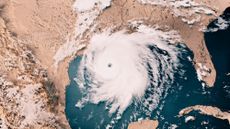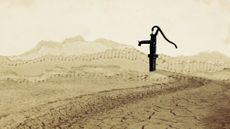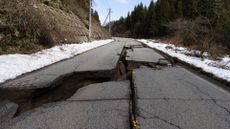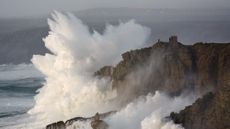Is the UK facing a water shortage?
Restrictions may be introduced later in the summer if there is below-average rainfall

Households have been warned by water companies to cut their water usage or risk taps running dry as the UK battles a scorching two-day heatwave.
Swathes of England have been issued with the Met Office’s first ever red extreme weather warning today, as temperatures are expected to beat the UK’s record of 38.7C, set in Cambridge in 2019, climbing as high as 40C on Tuesday. The UK could therefore be “hotter than Tamanrasset in the Sahara”, said the Daily Mirror.
With a “sweltering” heatwave gripping the nation, water companies are worried about the high demand for supplies and have suggested a range of ways to save water over the coming days.
Subscribe to The Week
Escape your echo chamber. Get the facts behind the news, plus analysis from multiple perspectives.

Sign up for The Week's Free Newsletters
From our morning news briefing to a weekly Good News Newsletter, get the best of The Week delivered directly to your inbox.
From our morning news briefing to a weekly Good News Newsletter, get the best of The Week delivered directly to your inbox.
Saving water
Yorkshire Water, which supplies more than 5 million people, has recommended that its customers take four-minute showers to help limit supply disruptions and has even suggested a playlist of songs “to help with time management”, said the Mirror.
Anglican Water has been slightly more generous to its 6 million customers, suggesting they take five-minute showers, avoid washing their cars and to “learn to love a brown lawn”. Meanwhile, Severn Trent has requested that its customers turn the tap off when they brush their teeth.
There has already been some disruption to water supplies in Essex, London and Surrey, where Affinity Water has asked customers to manage their usage. The company has “estimated that an extra 164 million litres will be required for Monday alone in comparison to usual demand”, said the paper, as temperatures are set to reach record levels.
On Sunday, residents in Norfolk were stranded without water “for more than 30 hours following a burst pipe”, reported the Mirror, forcing people to join long queues at water collection points.
Thames Water, the UK’s largest water supplier, has said it is taking a number of measures to “help keep taps running” as it is hit with massive demand, including “using tankers to pump extra water where it’s needed most” and delaying planned work so that teams can fix water pipes should problems occur in the coming days.
Hosepipe ban looms?
Water companies have warned that temporary water usage bans could be considered this summer to protect supplies “if the hot spell lingers and households continue to strain resources”, said the i news site.
Natalie Akroyd, water resources manager at Cambridge Water, which serves a population of about 300,000, told the paper: “At this stage we are not placing any restrictions on customers but, if the heatwave continues for an extended period and customers do not reduce their non-essential use, we can consider temporary usage bans (known as hosepipe bans) if necessary.”
Thames Water has also said restrictions may be put in place unless there is above-average rainfall in the remaining summer months.
“We’re not currently expecting to need to introduce restrictions on water use this summer, but we know the water we have stored in our reservoirs will reduce as people start to use more water in their gardens through the summer,” said a spokesperson.
“So if we do not receive around or above average rainfall in the coming months this will increase pressure on our resources and may result in the need for more water-saving measures, including restrictions.”
Reduced rainfall
Thames Water’s supply has “already been affected by reduced rainfall”, said the paper, with the region receiving only 65% of its average rainfall in the last three months, following similarly low levels over spring and winter.
Professor Paul Jeffrey, from Cranfield University, told the BBC that climate change and population growth was driving significant increases in the use of water resources, and water companies needed to become more resilient to pressures on water supplies.
“Being more efficient in the ways we use water, and storing or moving water between areas of deficit and areas of surplus, will all help to ensure more resilient supplies,” he told the broadcaster.
“Specific initiatives which can make a difference include water re-use, new reservoirs, leakage control, water conservation, and bulk transfers.”
Create an account with the same email registered to your subscription to unlock access.
Sign up for Today's Best Articles in your inbox
A free daily email with the biggest news stories of the day – and the best features from TheWeek.com
-
 Why is Bluey such a cultural phenomenon?
Why is Bluey such a cultural phenomenon?In the Spotlight Kids are obsessed — but parents get just as much out of the show, if not more
By Anya Jaremko-Greenwold, The Week US Published
-
 Is it actually economical to fly basic economy?
Is it actually economical to fly basic economy?The Explainer Airlines have placed so many restrictions on basic economy, you may wonder if it's even worth the savings anymore
By Becca Stanek, The Week US Published
-
 So bad, so good: the best worst movies
So bad, so good: the best worst moviesThe Week Recommends These films are as enjoyable as they are terrible
By Anya Jaremko-Greenwold, The Week US Published
-
 Is America running out of electrical power?
Is America running out of electrical power?Today's Big Question The nation's power grid appears to be reaching critical levels due to emerging technologies
By Justin Klawans, The Week US Published
-
 It might be time to add a new hurricane category
It might be time to add a new hurricane categoryUnder the Radar Any way the wind blows
By Devika Rao, The Week US Published
-
 The US is facing a groundwater crisis
The US is facing a groundwater crisisUnder the radar Stress is high as water runs low
By Devika Rao, The Week US Published
-
 Can the world really wean itself off coal?
Can the world really wean itself off coal?Today's Big Question 'Record' global consumption is set to fall soon but growing demand in China and India could increase tensions
By Harriet Marsden, The Week UK Published
-
 How did Japan's earthquake compare to others across the world?
How did Japan's earthquake compare to others across the world?Today's Big Question Relatively low death toll a testament to country's preparedness, say experts
By The Week UK Published
-
 Why are ocean waves getting bigger?
Why are ocean waves getting bigger?The Explainer Damaged coastlines and stronger storms are in our future
By Devika Rao, The Week US Published
-
 The microplastics hurricanes blowing across North America
The microplastics hurricanes blowing across North AmericaUnder the Radar New research confirms global pervasiveness of harmful microplastic pollution
By The Week Staff Published
-
 What can Cop28 really achieve?
What can Cop28 really achieve?Today's Big Question Climate summit in UAE proves controversial as UN warns world is falling short of global warming targets
By The Week UK Published